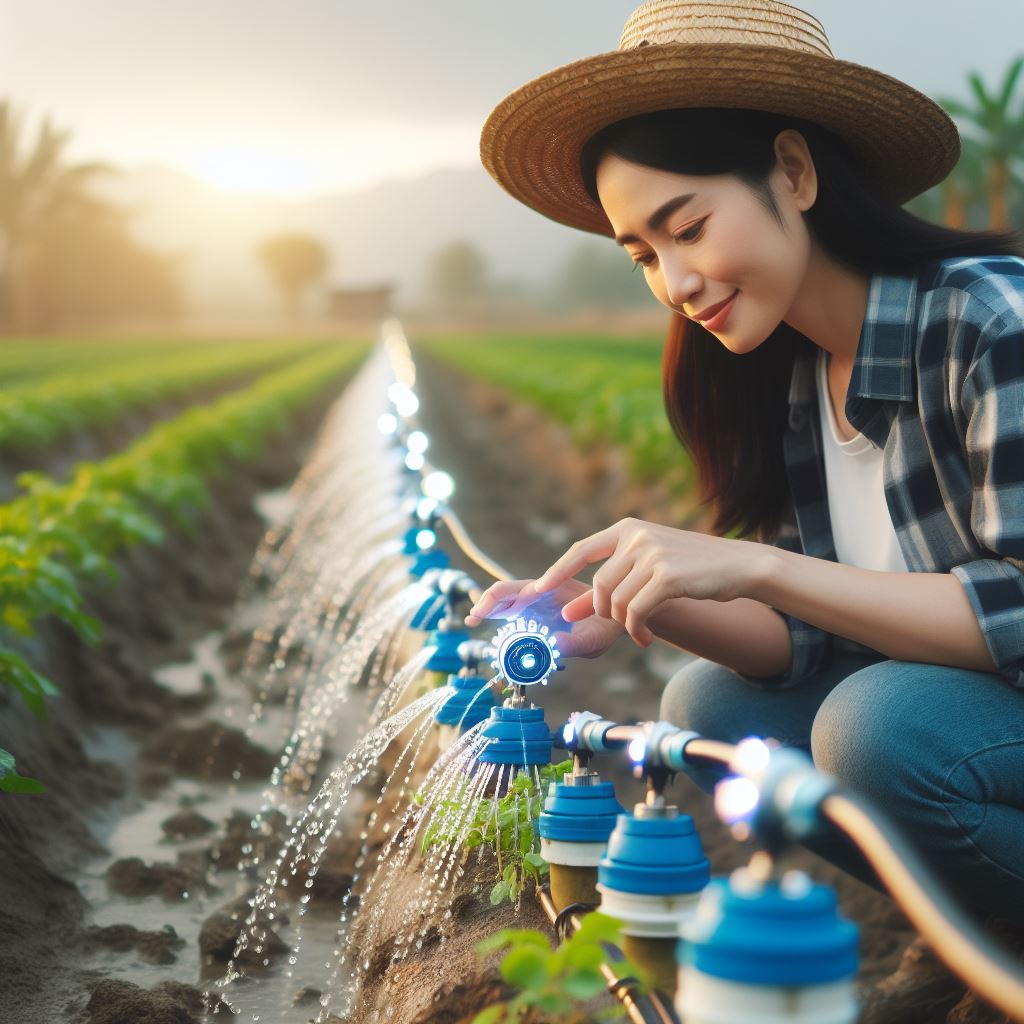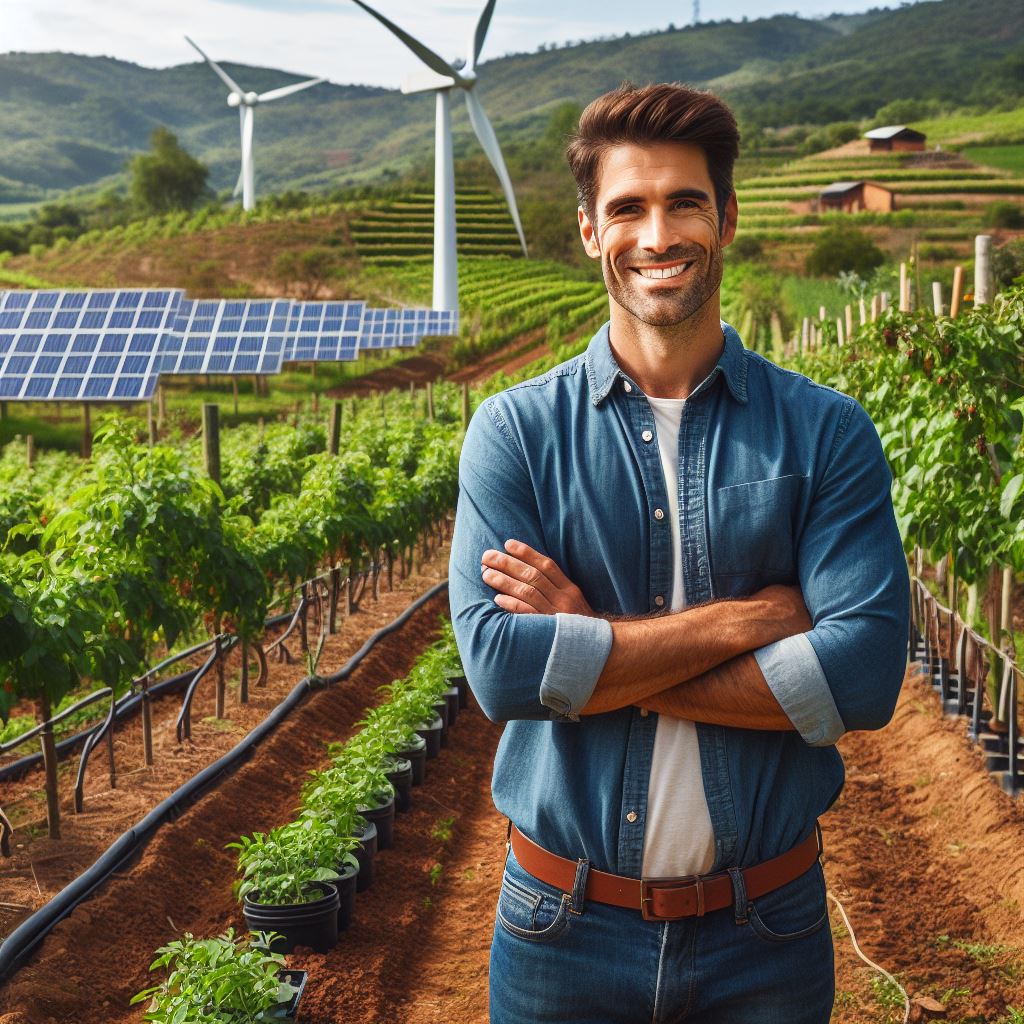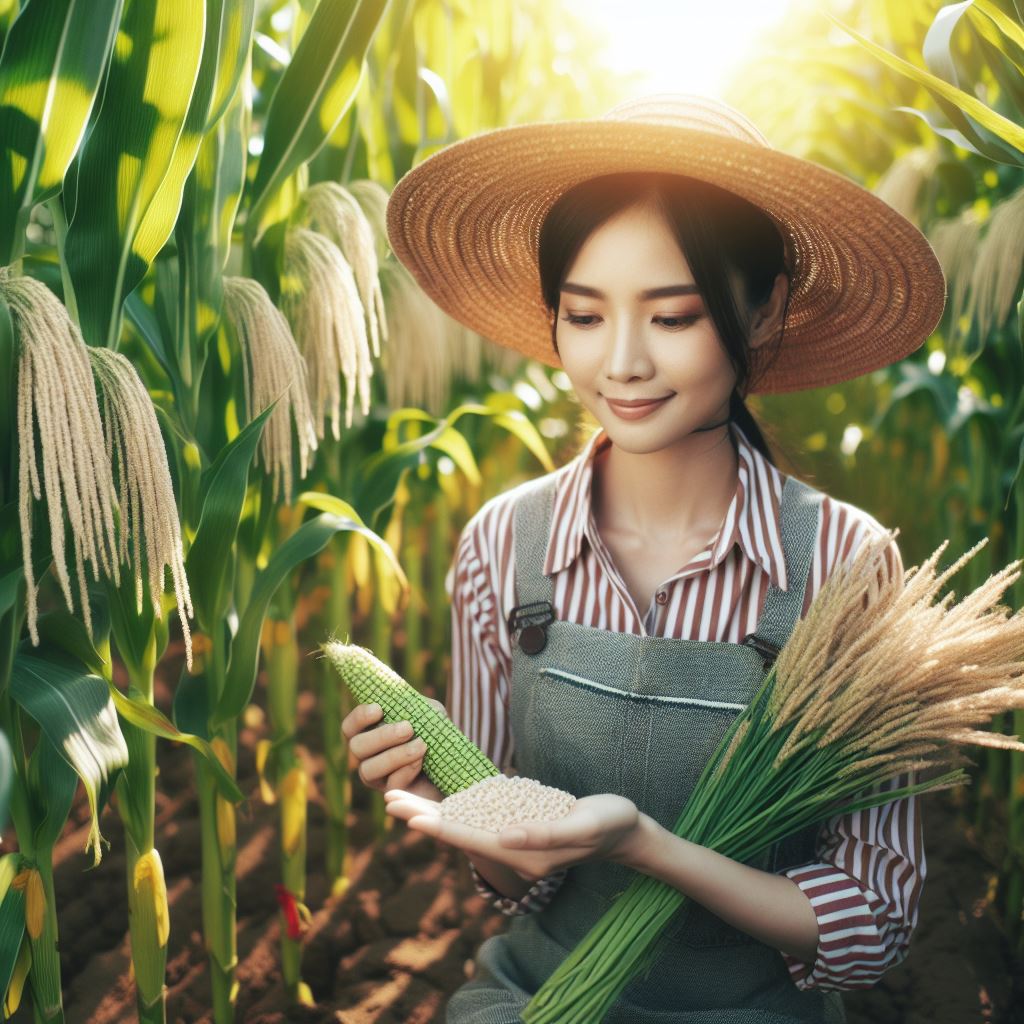Introduction
Smart irrigation systems are an innovative approach to managing water use in farming. These systems utilize advanced technology to optimize irrigation practices and conserve water.
Efficient water use is crucial in agriculture as it helps minimize water waste and promotes sustainability.
By implementing smart irrigation systems, farmers can reduce water consumption without compromising crop yield.
These systems use sensors and data analysis to determine the exact amount of water needed by crops.
They also consider factors like weather conditions and soil moisture to ensure precise irrigation.
Smart irrigation systems enable farmers to remotely monitor and control irrigation processes, improving efficiency and saving time.
In addition to water conservation, these systems also help minimize fertilizer and pesticide use.
Through targeted irrigation, nutrients are effectively delivered to plants, reducing the need for excessive chemical application.
Smart irrigation systems contribute to sustainable farming practices by promoting resource efficiency and environmental protection.
With the ever-increasing demand for food, these systems play a crucial role in ensuring food security for future generations.
In essence, smart irrigation systems offer a solution to the challenges of water scarcity and sustainable agriculture.
By adopting these systems, farmers can optimize water use, improve crop productivity, and contribute to a greener future.
The Need for Smart Irrigation Systems
Water scarcity and its impact on agriculture
Water scarcity poses a significant threat to agriculture, impacting crop productivity and sustainability.
As freshwater resources become increasingly limited, it is crucial to adopt smart irrigation systems to ensure efficient water use.
- Decreased water availability: With water scarcity on the rise, farmers encounter challenges in securing adequate water sources for their crops. This scarcity limits agricultural expansion and productivity.
- Crop yield reduction: Insufficient water supply leads to reduced crop yields and quality. Plants rely on water for essential physiological processes, including photosynthesis, nutrient uptake, and transpiration. Without enough water, plant growth slows down, resulting in lower yields.
- Soil degradation: Traditional irrigation methods can exacerbate soil degradation due to overwatering or improper water distribution. This not only affects crop health but also leads to the depletion of nutrients and increased soil erosion.
Inefficient traditional irrigation methods
Traditional irrigation methods have proven to be inefficient and wasteful, necessitating the adoption of advanced smart irrigation systems.
Transform Your Agribusiness
Unlock your farm's potential with expert advice tailored to your needs. Get actionable steps that drive real results.
Get StartedThese outdated practices consume excessive amounts of water, energy, and labor, putting a strain on the environment and agricultural industry.
- Flood irrigation: Flood irrigation, a widely used traditional method, involves flooding fields with water. This technique often results in uneven distribution and excessive water evaporation, leading to water wastage.
- Sprinkler irrigation: Sprinkler systems are another traditional method that disperses water through overhead sprinklers. However, due to their imprecise targeting, they frequently waste water through overspray and drift.
- Manual irrigation: Manual watering practices, such as using hoses or watering cans, can be highly inefficient. The lack of control over water volume and timing often results in both under and overwatering, causing plant stress and water waste.
Considering the drawbacks of conventional systems, it becomes evident that smart irrigation systems are essential to address water scarcity, promote sustainability, and optimize agricultural practices.
These systems utilize advanced technologies to precisely monitor and control water usage, ultimately reducing waste and improving overall efficiency.
Advantages of Smart Irrigation Systems
By adopting smart irrigation systems, farmers can leverage the following advantages:
- Precision irrigation: Smart systems incorporate sensors and data analysis to determine the exact water requirements of plants, ensuring they receive adequate hydration without wastage.
- Automated watering: With smart irrigation, farmers can automate watering schedules based on factors like weather changes, soil moisture levels, and plant-specific needs. This feature saves time and effort while optimizing water utilization.
- Water conservation: Smart systems enable the reuse of wastewater and rainwater, reducing reliance on freshwater sources. By incorporating water recycling, these systems contribute to water conservation efforts.
- Reduced costs: As smart irrigation systems minimize water waste and optimize resource usage, farmers can experience significant cost savings on water bills, energy consumption, and labor required for manual irrigation.
In fact, the need for smart irrigation systems is evident due to water scarcity’s detrimental impact on agriculture and the inefficiency of traditional methods.
By embracing advanced technologies and practices, farmers can ensure efficient water usage, improve crop productivity, and contribute to sustainable agriculture.
Embracing the move towards smart irrigation is not just a necessity but a wise investment for the future of agriculture.
Benefits of Smart Irrigation Systems
Conservation of water resources
- Smart irrigation systems use advanced technologies to optimize water usage.
- These systems monitor soil moisture levels and weather conditions to determine the appropriate amount of water needed.
- By delivering water only when necessary, smart irrigation systems help conserve water resources.
- This leads to a significant reduction in water wastage, especially in areas where water scarcity is a concern.
- Conservation of water resources is vital for the sustainability of agriculture and the environment.
Increased crop yields and quality
- Smart irrigation systems ensure that crops receive the right amount of water at the right time.
- This maximizes crop growth and enhances overall yield and quality.
- By avoiding over-watering or under-watering, these systems promote healthier plant development.
- Consistent and optimized irrigation also helps to prevent diseases and pests that thrive in waterlogged or drought-stressed conditions.
- As a result, farmers can enjoy higher crop production and better-quality harvests.
Cost savings for farmers
- Traditional irrigation methods often involve manual monitoring and guesswork, leading to inefficient water usage.
- Smart irrigation systems eliminate the need for manual intervention and make water delivery more precise and automated.
- This automation reduces labor and maintenance costs for farmers, making irrigation more cost-effective.
- Furthermore, by conserving water resources, farmers can reduce their water bills and expenses related to irrigation.
- The cost savings achieved through smart irrigation can contribute to the overall profitability of farming operations.
In all, smart irrigation systems offer numerous benefits for both farmers and the environment.
- They help in the conservation of water resources, ensuring sustainability for future generations.
- By optimizing water usage, these systems contribute to increased crop yields and improved quality.
- Furthermore, they provide cost savings for farmers through reduced labor, maintenance, and water expenses.
Implementing smart irrigation systems is a step towards efficient and sustainable water use in agriculture.
It not only benefits individual farmers by improving their productivity and profitability but also has a positive impact on the environment as a whole.
The adoption of these systems should be encouraged and supported to ensure a secure and prosperous future for agriculture.
Components of Smart Irrigation Systems
A smart irrigation system is composed of various components that work together to optimize water usage and enhance efficiency. These components include:
Soil Moisture Sensors
Soil moisture sensors are essential devices in smart irrigation systems. They monitor the moisture level in the soil and provide accurate data for deciding when to irrigate.
These sensors are installed at different depths in the soil to measure moisture variations throughout the root zone.
By monitoring soil moisture, these sensors can determine if the soil needs water or if it is already adequately saturated.
This information allows the system to regulate the irrigation schedule, ensuring that plants receive the right amount of water without wasting it.
Weather Stations and Predictive Analytics
Weather stations are another crucial component of smart irrigation systems. They collect weather data, including temperature, humidity, wind speed, and solar radiation.
This information is used to understand evapotranspiration rates and predict irrigation requirements.
Predictive analytics models analyze the collected weather data and predict future irrigation needs based on historical patterns and plant water requirements.
By incorporating weather forecasts into the system’s decision-making process, water usage can be optimized, and unnecessary irrigation can be avoided.
Automated Irrigation Controllers
Automated irrigation controllers are responsible for implementing the irrigation schedule based on inputs from the soil moisture sensors and weather stations.
These controllers are programmed to activate the irrigation system when the moisture levels are below a certain threshold or when the weather conditions indicate a need for irrigation.
These controllers can be set to specific watering schedules or allow for dynamic adjustments based on real-time data.
By automating the irrigation process, these controllers eliminate the need for manual intervention and ensure precise control over water application.
Showcase Your Farming Business
Publish your professional farming services profile on our blog for a one-time fee of $200 and reach a dedicated audience of farmers and agribusiness owners.
Publish Your ProfileCommunication Systems
Communication systems are the backbone of smart irrigation systems. They enable seamless connectivity between the various components, allowing them to exchange data and instructions.
These systems can be wired or wireless, depending on the specific requirements of the installation.
Communication systems facilitate real-time monitoring and control of the irrigation system. They enable remote access, allowing users to monitor and adjust irrigation schedules from anywhere using smartphones or computers.
This level of control improves efficiency, reduces water waste, and minimizes maintenance efforts.
Basically, smart irrigation systems comprise several interconnected components that work in harmony to optimize water usage.
Soil moisture sensors, weather stations, automated irrigation controllers, and communication systems collectively enable efficient and responsive irrigation.
By leveraging these components, smart irrigation systems promote sustainable water management and contribute to a greener and more sustainable future.
How Smart Irrigation Systems Work
A smart irrigation system is designed to help users efficiently manage water usage in their gardens or landscapes.
These systems utilize advanced technologies and data analysis to optimize watering schedules based on real-time soil moisture levels and weather conditions.
Monitoring soil moisture levels
- Smart irrigation systems employ various sensors to monitor the moisture content in the soil.
- These sensors are strategically placed in different areas to capture accurate data about soil conditions.
- The sensors continuously measure and transmit soil moisture readings to the central control system.
- Based on the collected data, the system determines whether irrigation is needed or not.
Analyzing weather data for optimized watering
- The smart irrigation system integrates with weather services to access real-time weather data.
- This data includes information such as temperature, humidity, rainfall, and evaporation rates.
- The system uses this weather data to calculate the evapotranspiration (ET) rate, which indicates the amount of water lost from the soil due to evaporation and plant transpiration.
- By incorporating the ET rate, the system can adjust the watering schedule to replenish the lost moisture effectively.
Remote and automated control of irrigation
- Smart irrigation systems are connected to a central control unit that manages the entire irrigation process.
- Users can access the control unit remotely through a smartphone app, computer, or dedicated interface.
- Remote access allows users to monitor and control their irrigation system from anywhere and anytime.
- The control unit uses the soil moisture data and weather information to automatically adjust the irrigation schedule.
When the system detects that the soil moisture levels are below the desired threshold, it triggers the irrigation process. The control unit instructs the valves to open, allowing water to flow through the irrigation system.
The water is distributed to the plants or lawn through sprinklers, drippers, or other types of irrigation devices.
Once the system determines that the soil has been adequately irrigated, it signals the valves to close, stopping the water supply.
This automated process eliminates the need for manual intervention and ensures optimal water usage.
In addition to remote monitoring and control, smart irrigation systems often come with advanced features such as water usage reports, predictive analytics, and customizable watering programs.
These features provide users with valuable insights into their water consumption patterns and help them make informed decisions to further optimize their irrigation practices.
Essentially, smart irrigation systems offer a practical solution for efficient water use in gardening and landscaping.
By leveraging soil moisture monitoring, weather data analysis, and remote control capabilities, these systems enable users to conserve water while maintaining healthy and vibrant outdoor spaces.
Read: Pest Control in Sustainable Farming

Case Studies
By analyzing the success stories of farms that have implemented smart irrigation systems and comparing them to traditional methods, it becomes evident that smart irrigation offers significant benefits.
The case studies reveal how farmers have achieved substantial water savings, improved crop yields, and reduced costs.
Success stories of farms using smart irrigation systems
Farm X, located in California, adopted a smart irrigation system that utilized soil moisture sensors and weather data. By leveraging real-time information, the farm managed to reduce water usage by 30% while maintaining healthy plant growth.
This not only conserved water but also saved the farm money on water bills.
Farm Y in Arizona saw similar positive results after implementing smart weather-based controllers.
By aligning their watering schedule with actual weather conditions, the farm was able to save $15,000 annually on their water bills.
This significant cost reduction demonstrates the economic benefits of smart irrigation systems.
Another case study conducted on Farm Z in Texas showcased the positive impact of smart irrigation on crop yields. By upgrading their irrigation system, the farm experienced a 20% increase in crop production.
This highlights how smart irrigation can optimize water delivery, improving plant health and overall farm productivity.
Comparison of traditional vs. smart irrigation results
Comparing the results of traditional methods with smart irrigation systems further emphasizes the advantages of the latter. Traditional irrigation, often relying on manual timers and fixed schedules, lacks adaptability and efficient water management.
In contrast, smart irrigation systems use soil moisture sensors, weather data, and evapotranspiration models to determine precise watering needs. By dynamically adjusting watering schedules, these systems optimize water usage and prevent water wastage.
A study comparing traditional irrigation with smart irrigation found that the latter reduced water consumption by an impressive 40%. This reduction in water usage not only contributes to water conservation efforts but also lowers operating costs for farmers.
Traditional irrigation methods are prone to oversaturation of soil, leading to nutrient leaching and damage to plant roots. Smart irrigation systems address this issue through continuous monitoring of soil moisture levels.
By delivering water only when necessary, smart systems prevent overwatering and preserve soil health.
A case study conducted on a vineyard demonstrated the effectiveness of smart irrigation in reducing water usage without impacting crop yields.
The vineyard successfully reduced water consumption by 50% while maintaining optimal grape production.
This showcases how smart irrigation can achieve significant water savings without sacrificing crop quality.
Furthermore, traditional irrigation methods require constant manual adjustments, making it challenging to adapt to changing weather patterns.
On the other hand, smart irrigation systems utilize real-time weather data to automatically adjust watering schedules.
This adaptability maximizes water efficiency and ensures plants receive the right amount of water based on prevailing conditions.
Overall, the case studies show that smart irrigation systems provide substantial benefits in terms of water conservation, cost savings, and improved crop yields.
By embracing these innovative technologies, farmers can optimize water usage, protect the environment, and ensure sustainable agricultural practices.
Showcase Your Farming Business
Publish your professional farming services profile on our blog for a one-time fee of $200 and reach a dedicated audience of farmers and agribusiness owners.
Publish Your ProfileRead: Diverse Crops for Healthier Soil
Gain More Insights: Eco-Friendly Weed Control in Agriculture
Challenges and Limitation
Smart irrigation systems have revolutionized the way water is utilized in various applications, promoting efficient water use and conservation.
However, like any technology, they also come with their share of challenges and limitations that need to be considered.
Initial costs and implementation challenges
A significant challenge associated with smart irrigation systems is the initial cost and implementation challenges.
While the long-term benefits of water savings are undeniable, the upfront investment required for purchasing and installing these systems can be a barrier for some individuals or organizations.
It is crucial to carefully assess the available options, consider the specific needs, and create a budget to ensure a successful implementation.
Moreover, smart irrigation systems require proper planning and research to identify the right system and components that are suitable for specific landscapes or agricultural applications.
The availability of different types and brands of systems can make the selection process overwhelming.
It is essential to evaluate factors such as climate, soil type, water source, and water requirements to determine the most appropriate solution.
The installation and setup of smart irrigation systems can also present challenges. The complexity of the process may require expertise or professional assistance to ensure the optimal functioning of the system.
Coordinating with irrigation specialists or technicians can help avoid any potential errors or inefficiencies during installation, ultimately maximizing the benefits of the system.
Maintenance and calibration requirements
Maintenance is another crucial aspect of smart irrigation systems. Regular upkeep is necessary to ensure their efficient operation and longevity.
Components such as sensors, controllers, and valves may require calibration and adjustment over time to maintain accurate measurements and control of water flow.
Monitoring the system and promptly addressing any issues or malfunctions are vital to prevent water waste or inefficient irrigation practices.
Compatibility issues with existing infrastructure
Compatibility issues with existing infrastructure can also pose challenges. Some older or conventional irrigation systems may not be compatible with smart technology.
In such cases, additional modifications or upgrades may be necessary to integrate the smart features.
Additionally, compatibility issues between different sensors, weather stations, and monitoring devices can restrict the functionality or access to advanced features of smart irrigation systems.
Essentially, while smart irrigation systems offer significant advantages in terms of efficient water use, they also come with challenges and limitations that need to be addressed.
The initial costs, implementation complexities, maintenance requirements, and compatibility issues with existing infrastructure should be carefully evaluated and managed to ensure successful adoption and long-term benefits.
Read: Integrated Pest Management for Crops
Future Trends in Smart Irrigation Systems
Integration with other smart farming technologies
Smart irrigation systems have the potential to integrate with other advanced farming technologies, such as soil sensors and drones.
This integration can result in a more holistic approach to farming, allowing farmers to gather data from multiple sources and make informed decisions about water management.
Advancements in data analytics and machine learning
As technology continues to evolve, so does the ability to analyze and interpret data collected by smart irrigation systems.
With advancements in data analytics and machine learning algorithms, farmers can benefit from more accurate predictions and recommendations for water usage.
This can optimize irrigation schedules and prevent overwatering.
Potential for government incentives and regulations
Governments around the world are recognizing the importance of efficient water use in agriculture.
They are exploring the potential for incentives and regulations to encourage the adoption of smart irrigation systems.
This can include tax breaks, subsidies, or even requirements for farmers to use water-saving technology.
Improved water management and conservation
The future of smart irrigation systems lies in their ability to enhance water management and conservation efforts.
By using real-time data and advanced algorithms, these systems can more accurately determine soil moisture levels and optimize watering schedules accordingly.
This can result in significant water savings and reduced environmental impact.
Enhanced connectivity and remote monitoring
Smart irrigation systems are becoming increasingly connected, allowing farmers to monitor and control their irrigation systems remotely. This connectivity enables real-time monitoring of water usage, soil conditions, and weather forecasts.
It also enables farmers to make adjustments to their irrigation systems from any location, enhancing convenience and efficiency.
Integration with climate change adaptation strategies
Climate change poses significant challenges to agriculture, including irregular rainfall patterns and increased water scarcity.
Smart irrigation systems can play a crucial role in climate change adaptation strategies by efficiently distributing water resources based on real-time data and weather forecasts.
This can help farmers mitigate the risks associated with changing climatic conditions.
Integration of precision agriculture techniques
Smart irrigation systems can be integrated with precision agriculture techniques, such as variable rate irrigation and targeted application of fertilizers.
This integration allows farmers to tailor irrigation and nutrient application based on specific crop needs, resulting in improved crop yields, reduced resource waste, and minimized environmental impact.
Exploration of alternative water sources
As water scarcity becomes a growing concern, the future of smart irrigation systems may involve the exploration and utilization of alternative water sources. This can include rainwater harvesting, wastewater treatment, and desalination.
Showcase Your Farming Business
Publish your professional farming services profile on our blog for a one-time fee of $200 and reach a dedicated audience of farmers and agribusiness owners.
Publish Your ProfileBy diversifying water sources, farmers can reduce their dependence on traditional freshwater sources and enhance the sustainability of their irrigation practices.
Therefore, the future trends in smart irrigation systems are promising.
Integration with other smart farming technologies, advancements in data analytics and machine learning, and government incentives and regulations all contribute to the development and adoption of these systems.
Additionally, improved water management, enhanced connectivity, and integration with climate change adaptation strategies and precision agriculture techniques further enhance the efficiency and sustainability of smart irrigation systems.
By exploring alternative water sources, farmers can ensure a more secure water supply for their agricultural activities.
The future holds great potential for smart irrigation systems, revolutionizing water use in agriculture and promoting sustainable farming practices.
Read: Soil Testing: Key to Effective Fertilization
Conclusion
Recap of the benefits of smart irrigation systems
Smart irrigation systems offer numerous benefits to farmers and the environment. These systems can optimize water usage, reduce waste, and improve crop yields.
With advanced technology and real-time data, farmers can ensure their fields receive the right amount of water at the right time, leading to efficient irrigation practices.
Encouraging farmers to adopt these sustainable practices
It is crucial to promote and educate farmers about the advantages of smart irrigation systems. Government incentives and subsidies can incentivize farmers to adopt these sustainable practices.
Additionally, training programs and awareness campaigns play a vital role in encouraging the widespread implementation of smart irrigation systems.




